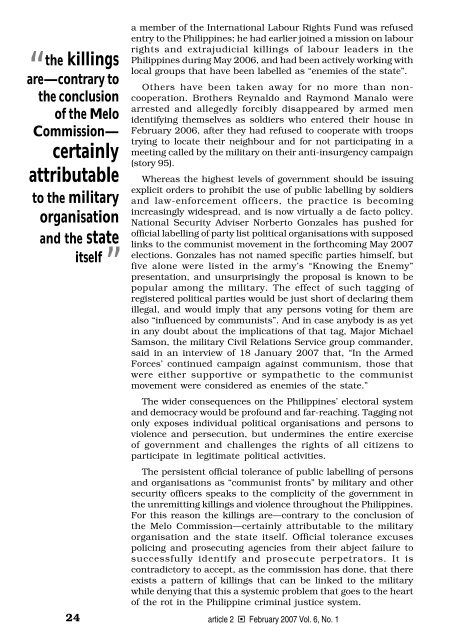of the Philippines the criminal justice system is - Article 2
of the Philippines the criminal justice system is - Article 2
of the Philippines the criminal justice system is - Article 2
You also want an ePaper? Increase the reach of your titles
YUMPU automatically turns print PDFs into web optimized ePapers that Google loves.
<strong>the</strong> killings<br />
are—contrary to<br />
<strong>the</strong> conclusion<br />
<strong>of</strong> <strong>the</strong> Melo<br />
Comm<strong>is</strong>sion—<br />
certainly<br />
attributable<br />
to <strong>the</strong> military<br />
organ<strong>is</strong>ation<br />
and <strong>the</strong> state<br />
itself ....<br />
“<br />
”<br />
24<br />
a member <strong>of</strong> <strong>the</strong> International Labour Rights Fund was refused<br />
entry to <strong>the</strong> <strong>Philippines</strong>; he had earlier joined a m<strong>is</strong>sion on labour<br />
rights and extrajudicial killings <strong>of</strong> labour leaders in <strong>the</strong><br />
<strong>Philippines</strong> during May 2006, and had been actively working with<br />
local groups that have been labelled as “enemies <strong>of</strong> <strong>the</strong> state”.<br />
O<strong>the</strong>rs have been taken away for no more than noncooperation.<br />
Bro<strong>the</strong>rs Reynaldo and Raymond Manalo were<br />
arrested and allegedly forcibly d<strong>is</strong>appeared by armed men<br />
identifying <strong>the</strong>mselves as soldiers who entered <strong>the</strong>ir house in<br />
February 2006, after <strong>the</strong>y had refused to cooperate with troops<br />
trying to locate <strong>the</strong>ir neighbour and for not participating in a<br />
meeting called by <strong>the</strong> military on <strong>the</strong>ir anti-insurgency campaign<br />
(story 95).<br />
Whereas <strong>the</strong> highest levels <strong>of</strong> government should be <strong>is</strong>suing<br />
explicit orders to prohibit <strong>the</strong> use <strong>of</strong> public labelling by soldiers<br />
and law-enforcement <strong>of</strong>ficers, <strong>the</strong> practice <strong>is</strong> becoming<br />
increasingly widespread, and <strong>is</strong> now virtually a de facto policy.<br />
National Security Adv<strong>is</strong>er Norberto Gonzales has pushed for<br />
<strong>of</strong>ficial labelling <strong>of</strong> party l<strong>is</strong>t political organ<strong>is</strong>ations with supposed<br />
links to <strong>the</strong> commun<strong>is</strong>t movement in <strong>the</strong> forthcoming May 2007<br />
elections. Gonzales has not named specific parties himself, but<br />
five alone were l<strong>is</strong>ted in <strong>the</strong> army’s “Knowing <strong>the</strong> Enemy”<br />
presentation, and unsurpr<strong>is</strong>ingly <strong>the</strong> proposal <strong>is</strong> known to be<br />
popular among <strong>the</strong> military. The effect <strong>of</strong> such tagging <strong>of</strong><br />
reg<strong>is</strong>tered political parties would be just short <strong>of</strong> declaring <strong>the</strong>m<br />
illegal, and would imply that any persons voting for <strong>the</strong>m are<br />
also “influenced by commun<strong>is</strong>ts”. And in case anybody <strong>is</strong> as yet<br />
in any doubt about <strong>the</strong> implications <strong>of</strong> that tag, Major Michael<br />
Samson, <strong>the</strong> military Civil Relations Service group commander,<br />
said in an interview <strong>of</strong> 18 January 2007 that, “In <strong>the</strong> Armed<br />
Forces’ continued campaign against commun<strong>is</strong>m, those that<br />
were ei<strong>the</strong>r supportive or sympa<strong>the</strong>tic to <strong>the</strong> commun<strong>is</strong>t<br />
movement were considered as enemies <strong>of</strong> <strong>the</strong> state.”<br />
The wider consequences on <strong>the</strong> <strong>Philippines</strong>’ electoral <strong>system</strong><br />
and democracy would be pr<strong>of</strong>ound and far-reaching. Tagging not<br />
only exposes individual political organ<strong>is</strong>ations and persons to<br />
violence and persecution, but undermines <strong>the</strong> entire exerc<strong>is</strong>e<br />
<strong>of</strong> government and challenges <strong>the</strong> rights <strong>of</strong> all citizens to<br />
participate in legitimate political activities.<br />
The pers<strong>is</strong>tent <strong>of</strong>ficial tolerance <strong>of</strong> public labelling <strong>of</strong> persons<br />
and organ<strong>is</strong>ations as “commun<strong>is</strong>t fronts” by military and o<strong>the</strong>r<br />
security <strong>of</strong>ficers speaks to <strong>the</strong> complicity <strong>of</strong> <strong>the</strong> government in<br />
<strong>the</strong> unremitting killings and violence throughout <strong>the</strong> <strong>Philippines</strong>.<br />
For th<strong>is</strong> reason <strong>the</strong> killings are—contrary to <strong>the</strong> conclusion <strong>of</strong><br />
<strong>the</strong> Melo Comm<strong>is</strong>sion—certainly attributable to <strong>the</strong> military<br />
organ<strong>is</strong>ation and <strong>the</strong> state itself. Official tolerance excuses<br />
policing and prosecuting agencies from <strong>the</strong>ir abject failure to<br />
successfully identify and prosecute perpetrators. It <strong>is</strong><br />
contradictory to accept, as <strong>the</strong> comm<strong>is</strong>sion has done, that <strong>the</strong>re<br />
ex<strong>is</strong>ts a pattern <strong>of</strong> killings that can be linked to <strong>the</strong> military<br />
while denying that th<strong>is</strong> a <strong>system</strong>ic problem that goes to <strong>the</strong> heart<br />
<strong>of</strong> <strong>the</strong> rot in <strong>the</strong> Philippine <strong>criminal</strong> <strong>justice</strong> <strong>system</strong>.<br />
article 2 • February 2007 Vol. 6, No. 1

















